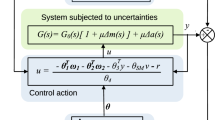Abstract
Discrete-time linear systems with switching in the repetitive mode are considered. The systems are subjected to random disturbances, and the measurements are corrupted by additive noises. Two iterative learning control design methods are proposed. Both of the methods involve an auxiliary 2D model in the form of a discrete repetitive process. The first method is based on the dissipativity conditions established for the auxiliary model with a special choice of the supply rate and storage function. This choice allows finding a control law (in the general case, nonlinear) that ensures the convergence of the learning process. The second method adopts a linear iterative learning control update law of a given form, while the convergence of the learning process is ensured by the stability conditions of the auxiliary 2D model. The structure of both control laws includes a stationary Kalman filter. The stability conditions are obtained using the divergent method of vector Lyapunov functions. An example is given to demonstrate the capabilities and features of the new method.



Similar content being viewed by others
References
Garden, M.Learning Control of Actuators in Control Systems, US Patent no. 3555252, 1971.
Uchiyama, M. Formulation of High-Speed Motion Pattern of a Mechanical Arm by Trial. Trans. SICE (Soc. Instrum. Control Eng.) 14(no. 6), 706–712 (1978).
Arimoto, S., Kawamura, S. & Miyazaki, F. Bettering Operation of Robots by Learning. J. Robotic Systems 1(no. 2), 123–140 (1984).
Arimoto, S., Kawamura, S., and Miyazaki, F.Bettering Operation of Dynamic Systems by Learning: A New Control Theory for Servomechanism or Mechatronic Systems, Proc. 23rd Conf. Decicion Control, Las Vegas, 1984, pp. 1064–1069.
Craig, J.J.Adaptive Control of Manipulators through Repeated Trials, Proc. Am. Control Conf., 1984, pp. 1566–1573.
Casalino, G. and Bartolini, G.A Learning Procedure for the Control of Movements of Robotic Manipulators, Proc. IASTED Symp. Robot. Autom., 1984, pp. 108–111.
Xu, J.-X. & Tan, Y. Linear and Nonlinear Iterative Learning Control, Lecture Notes in Control and Information Sciences. (Springer, New York, 2003).
Ahn, H.-S., Moore, K. L. & Chen, Y. Q. Iterative Learning Control. Robustness and Monotonic Convergence for Interval Systems. (Springer-Verlag, London, 2007).
Bristow, D. A., Tharayil, M. & Alleyne, A. G. A Survey of Iterative Learning Control. IEEE Control Syst. Mag. 26(no. 3), 96–114 (2006).
Ahn, H.-S., Chen, Y. Q. & Moore, K. L. Iterative Learning Control: Brief Survey and Categorization. IEEE Trans. Syst., Man, Cybernet. Part C: Appl. Reviews 37(no. 6), 1099–1121 (2007).
Shen, D. & Wang, Y. Survey on Stochastic Iterative Learning Control. J. Process Control 24, 64–77 (2014).
Shen, D. & Technical, A. Overview of Recent Progresses on Stochastic Iterative Learning Control. UST 6(no. 3), 147–164 (2018).
Saab, S. S. Discrete-Time Stochastic Learning Control Algorithm. IEEE Trans. Autom. Control 46, 877–887 (2001).
Saab, S. S. On a Discrete-Time Stochastic Learning Control Algorithm. IEEE Trans. Autom. Control 46(no. 8), 1333–1336 (2001).
Saab, S. S. Stochastic P-type/D-type Iterative Learning Control Algorithms. Int. J. Control 76(no. 2), 139–148 (2003).
Saab, S. S. A Stochastic Iterative Learning Control Algorithm with Application to an Induction Motor. Int. J. Control 77(no. 2), 144–163 (2004).
Saab, S. S. Optimal Selection of the Forgetting Matrix into an Iterative Learning Control Algorithm. IEEE Trans. Autom. Control 50(no. 12), 2039–2043 (2005).
Saab, S. S. Optimality of First-Order ILC among Higher Order ILC. IEEE Trans. Autom. Control 51(no. 8), 1332–1336 (2006).
Pakshin, P., Emelianova, J., Galkowski, K., and Rogers, E., Iterative Learning Control Design for Discrete Stochastic Linear Systems, Proc. 2019 Eur. Control Conf., June 25–28, 2019, Napoli, Italy, pp. 3776–3771.
Pakshin, P., Emelianova, J., Rogers, E., and Gałkowski, K.Repetitive Process Based Stochastic Iterative Learning Control Design for Linear Dynamics, Syst. Control Lett., 2020, vol. 137. https://doi.org/10.1016/j.sysconle.2020.104625
Pakshin, P. V., Koposov, A. S. & Emelianova, J. P. Iterative Learning Control of a Multiagent System under Random Perturbations. Autom. Remote Control 81(no. 3), 483–502 (2020).
Oh, S.-K. & Lee, J. M. Stochastic Iterative Learning Control for Discrete Linear Time-Invariant System with Batch-Varying Reference Trajectories. J. Proc. Control 36, 64–78 (2015).
Liberzon, D. Switching in Systems and Control. (Birkhäuser, Boston, 2003).
Shorten, R., Wirth, F., Mason, O., Wulff, K. & King, C. Stability Criteria for Switched and Hybrid Systems. SIAM Review 49, 545–592 (2007).
Lin, H. & Antsaklis, P. J. Stability and Stabilizability of Switched Linear Systems: A Survey of Recent Results. IEEE Tran. Autom. Control 54, 308–321 (2009).
Sun, Z. & Ge, S. S. Stability Theory of Switched Dynamical Systems. (Springer-Verlag, London, 2011).
Alwan, M. S. & Liu, X. Theory of Hybrid Systems: Deterministic and Stochastic. (Springer Nature Singapore and Higher Education Press, Beijing, 2018).
Rogers, E., Gałkowski, K., and Owens, D.H.Control Systems Theory and Applications for Linear Repetitive Processes, Lecture Notes in Control and Information Sciences, vol. 349, Berlin: Springer-Verlag, 2007.
Pakshin, P., Emelianova, J., Emelianov, M., Gałkowski, K. & Rogers, E. Dissipativity and Stabilization of Nonlinear Repetitive Processes. Syst. Control Lett. 91, 14–20 (2016).
Pakshin, P., Emelianova, J., Emelianov, M., Gałkowski, K. & Rogers, E. Stochastic Stability of Some Classes of Nonlinear 2D Systems. Autom. Remote Control 79(no. 1), 89–102 (2018).
Pakshin, P., Emelianova, J., Gałkowski, K. & Rogers, E. Stabilization of Two-dimensional Nonlinear Systems Described by Fornasini-Marchesini and Roesser Models. SIAM J. Control Optim. 56, 3848–3866 (2018).
Pakshin, P., Emelianova, J., Emelianov, M., Gałkowski, K. & Rogers, E. Passivity Based Stabilization of Repetitive Processes and Iterative Learning Control Design. Syst. Control Lett. 122, 101–108 (2018).
Apkarian, J., Karam, P. & Levis, M. Workbook on Flexible Link Experiment for Matlab/Simulink Users. (Quanser, Markham, 2011).
Author information
Authors and Affiliations
Rights and permissions
About this article
Cite this article
Pakshin, P., Emelianova, J. Iterative Learning Control Design for Discrete-Time Stochastic Switched Systems. Autom Remote Control 81, 2011–2025 (2020). https://doi.org/10.1134/S0005117920110053
Received:
Revised:
Accepted:
Published:
Issue Date:
DOI: https://doi.org/10.1134/S0005117920110053




